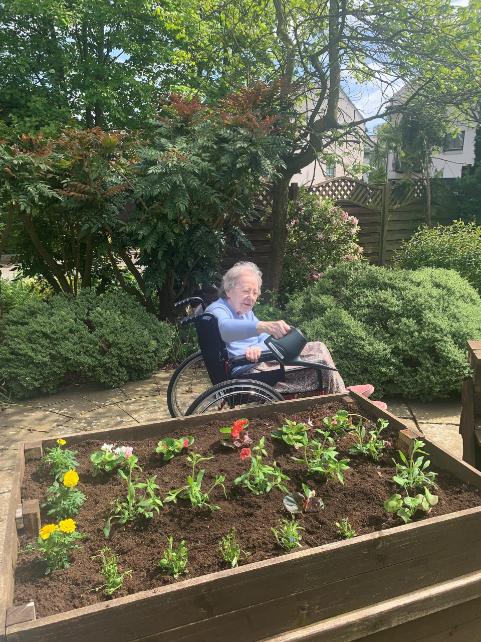Organising Respite Care in Scotland

Respite care offers essential support by providing temporary relief to those who care for a family member or friend. Short-term care gives carers time to rest and focus on their own wellbeing, while ensuring that their loved one continues to receive the care and attention they need in a safe and reassuring environment. Respite care also offers older people a chance to enjoy a short sociable holiday with plenty of activities and lots of good food they don't have to cook themselves.
Respite care can be planned in advance or arranged at short notice. These breaks can last from two weeks, depending on the individual’s needs and circumstances. What’s most important is that the care work provided during this time is consistent, compassionate and tailored to each person. Respite care services provide care to those in need, ensuring ongoing support while the primary carer is away.
For many carers, taking regular breaks through respite care helps prevent burnout and supports their ability to continue in their caring role for the long term. It’s a simple yet powerful way of looking after both the carer and the person being cared for – recognising that a well deserved break is not a luxury, but a vital part of providing high-quality, sustainable care.
Types of Respite Care
Every caring relationship is different, and so are the needs that come with it. That’s why respite care is designed to be flexible. Whether your loved one needs a few hours of support or round-the-clock care, there are respite care options available to suit a wide range of situations.
Residential care provides a comprehensive level of support for individuals who require assistance throughout the day and night. Short term respite care or short-term residential stays are a good opportunity for your loved one to enjoy a change of scenery, meet new people and benefit from structured support in a warm and welcoming setting. Many care homes also offer respite care, providing both palliative and long-term respite care, tailored to those with more advanced health needs. These services are especially beneficial for older people and those living with disabilities, ensuring that a range of needs are met with specialised support.
The length and type of respite care can vary depending on individual circumstances, allowing for personalised and adaptable care arrangements. No matter the type of respite care, the focus remains the same: providing compassionate, personalised support that honours the dignity and preferences of the individual, while giving carers the rest they deserve. A temporary break through respite care allows caregivers to rest and recharge knowing their loved one is well cared for.


Arranging Respite Care
Arranging respite care may feel bewildering, especially if it’s the first time you’ve considered it as an option. But with the right support and information, the process can be straightforward and reassuring. The first thing to consider is what kind of respite care would best meet your loved one’s needs. Whether it’s a few hours of help at home or a short residential stay, there are respite care services available through both local councils and private care providers. Speaking with your GP or local adult social care team can be a helpful starting point, especially if you’re unsure what support is available in your area.
If you’re caring for someone regularly, you’re entitled to request a carer’s assessment from your local authority. This looks at how your caring role affects your life and what support might help – including respite care. A carer's assessment is essential for determining your eligibility for council-funded support and respite services. Your loved one may also need a needs assessment, which helps determine what type of care they require. These assessments are free and can open the door to funding and support you may not realise you’re eligible for. After the assessment, a care plan is developed to tailor support to your individual needs and circumstances.
Some families choose to organise respite care privately. In this case, you can contact a trusted care provider directly to talk through the options. If you receive a personal budget or direct payments, you may also be able to use these to fund respite care through a provider of your choice. If you do not qualify for council funding, you can arrange your own respite care by self-funding and exploring private options.
Respite care can be arranged for a specific period, such as a few weeks after an older person is discharged from hospital following an operation, but it can also be booked to test drive the benefits of living in a nursing home if your loved one is considering a more permanent move and wants to try before they buy. Support is also available for emergency respite care if something changes suddenly and you need help quickly. Many care homes and home care providers have procedures in place to respond to urgent situations with care and sensitivity.
Financial Support for Respite Care
One of the most common concerns for families considering respite care is cost. While every situation is different, it’s important to know that financial support may be available to help cover the expense of short-term care. There are various sources of respite care funding, including government programs, local councils, and charitable organisations, that can help make a break more affordable. Understanding the options can make the process feel more manageable and ensure that taking a break remains a realistic and accessible choice.
For many carers, the first step is to contact their local council. If you’re providing regular care for someone, you’re entitled to request a carer’s assessment, which can help determine whether you’re eligible for funding support. At the same time, the person you care for may need a needs assessment, which looks at what type of care they require and how it should be funded. If you receive carer's allowance, it's important to check how taking a break might affect your benefits, as some breaks could impact your entitlement.
If the outcome of these assessments confirms that respite care is appropriate, the council may offer financial assistance to cover part or all of the cost. This could include a direct service, where the council arranges the care for you, or a personal budget that gives you more choice and control over how the care is delivered. Some carers also receive direct payments, which can be used to pay for respite care through a provider of their choosing. The council will carry out a financial assessment to determine your eligibility for funding and how much you may need to contribute towards the cost.
If you’re arranging respite care privately, you will typically need to cover the costs yourself. However, help may still be available. Some charities and benevolent funds offer grants or contributions towards the cost of short-term care. These grants are designed to provide financial help to unpaid carers who need a break but might not qualify for council funding. Organisations such as Carers Trust, and condition-specific charities may be able to help, depending on your circumstances.
If you’re unsure about what you may be entitled to, your local authority can provide clear advice about eligibility, assessment processes, and funding arrangements. Many care providers also offer guidance or can connect you with someone who specialises in care funding support.
Whatever your financial situation, it’s important to remember that respite care is not an extra – it’s an essential part of sustaining long-term care, and there are options available to help make it possible. In addition to carer's allowance, you may be eligible for other benefits or extra support, so it’s worth exploring all available resources.
Benefits of Respite Care
Respite care gives carers the opportunity to rest, recharge and take care of their own health, which in turn helps them continue offering the best possible support to their loved ones. Supporting loved ones through quality respite care ensures both carers and those they care for receive the attention and relief they need. Far from being a sign of stepping back, using respite care is an act of strength and responsibility.
One of the most immediate benefits of respite care is that it reduces the risk of burnout. Caring can be physically tiring and emotionally draining, especially when it continues over months or years without a break. Regular time away, even for just a few days, gives carers the space to rest and restore their energy. Carers breaks, whether scheduled or occasional, are essential for maintaining well-being and preventing exhaustion. Many return feeling more balanced, patient and able to cope with the challenges of their role.
It also provides peace of mind. Knowing that your loved one is being supported by experienced, compassionate professionals allows you to step away without guilt or worry. Access to professional respite support ensures that care is managed to high standards, giving carers confidence that their loved one is in safe hands. Whether care is delivered in a care home or within the home itself, respite services are designed to provide continuity, comfort and dignity at all times.
In urgent situations, respite care can be arranged at a moment's notice, ensuring that carers have immediate support when unexpected needs arise. This responsiveness is crucial for families facing emergencies or sudden changes in circumstances.
Respite care doesn’t just benefit the carer – it can also be a positive experience for the person being cared for. A change in routine, new surroundings, or the opportunity to meet new people can bring stimulation, variety and a sense of independence. In many cases, people return from a short stay having enjoyed the social interaction and gentle encouragement that comes with a change of environment. The person you care for receives individual attention and support tailored to their unique needs.
Longer-term, regular respite breaks can help maintain the stability of the caring relationship. By protecting their own health and wellbeing, carers are better able to avoid exhaustion and continue supporting their loved one at home for as long as possible. This can also help delay or reduce the need for more intensive or permanent care solutions. Respite care can help families access wider forms of support. Some care providers offer access to counselling, peer groups or advice services, helping carers feel less alone in their journey. These networks can be just as valuable as the care itself.
Above all, respite care gives carers permission to look after themselves – to rest, to breathe, and to return to their role with renewed strength. And for the person being cared for, it offers a gentle reassurance that their wellbeing is always a priority, even when their usual carer is away.



How Respite Care Works
Respite care is built around the needs of both the person receiving care and the carer themselves. It’s designed to be flexible, dependable and easy to access, with the aim of offering the right support at the right time. Whether it’s planned well in advance or needed at short notice, the process is centred on providing all the benefits of a short stay in a care home, where they can enjoy a change of scenery, meet new people and take part in activities in a warm and welcoming setting.
For those with more complex needs, respite care may include support with mobility, medication, dementia care or even palliative care. Services are always tailored to the individual, with detailed care plans in place to ensure every person receives support that feels familiar, respectful and personal.
Care providers work closely with families to make sure everything runs smoothly. Before any respite stay or visit begins, there is usually an opportunity to meet with the care team, discuss specific needs, and share any personal preferences that would help make the experience more comfortable. This might include favourite foods, daily routines, mobility needs or how someone likes to spend their time. The goal is always to make the experience feel as close to home as possible.
Respite Care Services at Struan Lodge Care Home
Choosing respite care is never about stepping away – it’s about making sure both you and your loved one are supported in the way you deserve. At Struan Lodge Care Home in Edinburgh, we understand the importance of trust, comfort and continuity. Whether you're planning a short break or need support at short notice, our dedicated team is here to provide high-quality, compassionate care in a safe and homely setting.
If you’d like to learn more about our respite care services or arrange a visit, please get in touch – we’re here to help every step of the way.





